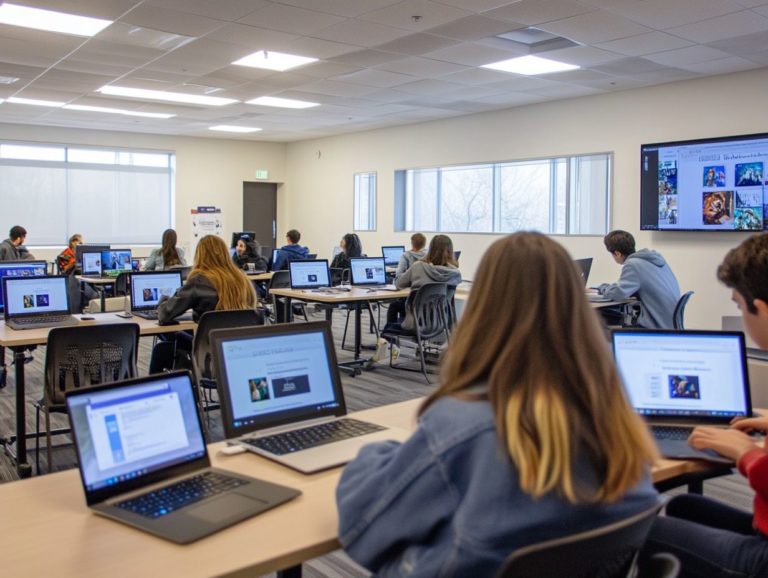How to Choose Between Online and In-Person Courses?
In today s fast-paced world, deciding between online and in-person courses has become an essential consideration for learners from all walks of life.
Each format presents its own unique advantages and challenges, making it vital for you to determine which aligns best with your personal learning style and lifestyle.
This article delves into the benefits and drawbacks of both online and in-person learning, discussing important topics like scheduling and cost, and guiding you toward making the right choice for your educational journey.
Contents
- Key Takeaways:
- Pros and Cons of Online Courses
- Pros and Cons of In-Person Courses
- Factors to Consider When Choosing Between Online and In-Person Courses
- Making the Decision: Which Type of Course is Right for You?
- Frequently Asked Questions
- Wondering what s best for your learning?
- What factors should I consider when choosing between online and in-person courses?
- Are online courses more convenient than in-person courses?
- Which option is more cost-effective?
- Will the quality of education be the same for online and in-person courses?
- What type of support is available for online and in-person courses?
- Can I switch between online and in-person courses during a program?
Key Takeaways:

- Online courses offer flexibility and convenience.
- In-person courses provide structured, interactive experiences.
- Consider your learning style, schedule, and budget.
What are Online and In-Person Courses?
Online and in-person courses represent two distinct educational pathways, each tailored to different learning styles and preferences.
When you choose online classes, like those offered by UTSA Online, you’re stepping into a world of virtual classrooms and digital platforms. This format lets you engage with coursework from anywhere, accommodating your unique schedule.
On the other hand, in-person classes focus on face-to-face interactions and collaborative learning in a traditional setting.
Both formats have exciting benefits and some challenges to consider that can significantly impact your learning outcomes and overall educational experience.
For example, online education often appeals to those of you juggling work or personal commitments, allowing for a self-paced approach that can enhance your time management skills.
However, while it offers convenience, it might lack the immediate feedback and social engagement you d find in an in-person setting, where relationships can thrive through direct communication and group activities.
In-person classes may cultivate a stronger sense of community and accountability among peers, but they do come with fixed schedules that can limit your flexibility.
As such, the adaptability of academic programs varies widely. Online options are continually evolving to incorporate immersive technologies (like virtual reality) that enhance the learning experience, while traditional classrooms hold onto their foundational structure, integrating digital elements as they progress.
Pros and Cons of Online Courses
Online courses present a wealth of benefits alongside specific challenges that you must navigate to fully optimize your learning potential.
The primary advantages include the flexibility that online learning affords, enabling you to manage your schedule with greater ease.
- You ll also find personalized learning experiences tailored to your unique style.
- Let s not overlook the affordability that makes higher education accessible to a wider audience.
However, you may encounter hurdles such as diminished engagement and the absence of immediate feedback that traditional classes typically provide.
Benefits of Online Learning
The benefits of online learning are truly remarkable, especially for you as a student seeking flexibility in your educational journey.
This flexibility allows you to tailor your academic pursuits around your work and family commitments. Personalized learning experiences cater to your unique learning style, enhancing both comprehension and retention.
Plus, with online education being more affordable, higher education becomes accessible to you. The incorporation of technology means you receive immediate feedback that supports your growth.
This format gives you the power to balance your studies with life’s demands, whether you’re attending a job or managing household responsibilities. Imagine being a parent who can access recorded lectures during nap times, creating space for quality family interactions while still pursuing a degree.
The individualized pathways in online classes enable you to progress at your own pace, giving you the opportunity to spend extra time mastering challenging concepts.
Think about someone who has struggled with mathematics; by revisiting specific modules repeatedly, they can build confidence and proficiency in ways that traditional classrooms might not allow.
The use of digital tools not only boosts your engagement but also cultivates a vibrant community of learners, allowing you to interact through forums and enrich your educational experience with shared knowledge and diverse perspectives.
Ready to find the right course for you? Start exploring your options today!
Challenges of Online Learning
Online learning offers distinct advantages, yet it also presents notable challenges that can impede your success. You may find that decreased engagement arises due to the absence of face-to-face interactions, which are vital for building strong relationships and fostering collaborative learning environments.
You might struggle to receive immediate feedback and adequate support. This can impact your overall learning outcomes and motivation to complete coursework. These challenges often lead to feelings of isolation and frustration, making it all the more difficult to stay motivated in today’s demanding educational landscape.
To tackle these issues, institutions can implement:
- Regular check-ins
- Virtual community-building activities
- Peer mentorship programs that encourage you to connect with your fellow students
Leveraging technology can further enhance your experience. Think real-time discussion forums and virtual office hours with instructors that provide timely assistance and cultivate a sense of community.
Offering flexible learning options, such as recorded lectures, can enrich your experience. This ensures you have the resources you need to absorb the material at your own pace, ultimately enhancing your overall experience in online education.
Pros and Cons of In-Person Courses

In-person courses provide a traditional learning experience that helps build strong relationships among students. This greatly enhances your educational journey.
The key benefits of attending in-person classes include:
- Jump right into the action with instant engagement from friends and teachers!
- Enriched learning outcomes through active participation
- Invaluable networking opportunities that can be more elusive in online environments
These courses can present challenges like rigid schedules and potential accessibility hurdles for some students.
Benefits of In-Person Learning
The benefits of in-person learning are truly remarkable, especially for those who flourish in a structured and interactive setting. Traditional learning formats offer face-to-face interactions that significantly enhance communication and collaboration between you and your instructors.
The networking opportunities in these classes allow you to build lasting relationships and professional connections. Robust student support systems are typically more accessible, leading to heightened engagement and overall satisfaction.
Many have discovered that the dynamic classroom atmosphere sparks their passion for learning. This sentiment is echoed in testimonials from recent graduates. For instance, one former student shared how collaborative projects ignited their creativity, enabling them to brainstorm ideas with peers in real time.
Similarly, a parent observed her child s confidence blossoming through spontaneous discussions with motivated classmates. This provides a supportive network that online learning sometimes struggles to offer. These personal interactions not only foster a strong sense of community but also enrich the learning experience, making in-person education invaluable for many.
Challenges of In-Person Learning
In-person learning, while brimming with advantages, also presents distinct challenges that can affect your academic experience.
Managing your schedule can become a considerable hurdle, especially if you’re juggling work or family commitments. This often leads to conflicts between attending classes and fulfilling personal responsibilities.
Accessibility issues may also come into play, particularly for students with disabilities or those residing in remote areas. These challenges can create significant stress, making it crucial to find solutions!
However, institutions can take proactive steps to address these issues by offering flexible course schedules and hybrid learning options (a mix of in-person and online classes) that cater to diverse needs. By enhancing accessibility through tailored resources and supportive technologies, they can ensure that all students have equitable opportunities to participate in discussions and collaborate on projects.
By prioritizing these considerations, educational environments can create a more inclusive atmosphere, empowering you to thrive both academically and socially. Explore how schools are innovating to help you succeed in today’s learning environments!
Factors to Consider When Choosing Between Online and In-Person Courses
Selecting between online and in-person courses requires thoughtful consideration of several key factors that can greatly affect your educational experience.
Your learning style is crucial in this decision. Some individuals thrive in the flexibility of an online setting, while others find their stride in the structured environment of traditional classrooms.
Managing your schedule effectively is vital for balancing academic demands with personal commitments. It’s also important to assess cost and accessibility to ensure that your educational choices align with your academic goals and financial realities.
Learning Style and Preferences
Understanding your learning style and preferences is essential when weighing the options between online and in-person courses. Different learners thrive under personalized approaches tailored to their unique needs whether it s the engaging atmosphere of traditional classrooms or the flexible, self-paced nature of online learning.
Recognizing these preferences can significantly impact your engagement levels and overall satisfaction with your chosen educational format.
If you’re a visual learner, you may find that multimedia-rich environments help you flourish. Online courses featuring videos and interactive simulations can be particularly enticing for you.
If you lean towards auditory learning, in-person classes filled with discussions and lectures may provide a more effective platform for absorbing information.
If hands-on experiences resonate with you, learning by doing might attract you to courses that incorporate lab work or physical activities, which are often more abundant in face-to-face settings.
By identifying your preferred learning styles, you can select courses that deepen your understanding of the material and align with the way you learn best. This ultimately leads to a more enriching educational journey.
Scheduling and Time Management

Effective scheduling and time management are essential when considering online versus in-person education. The flexibility of online learning offers a significant advantage, especially for those juggling various commitments.
You can craft a study schedule that aligns seamlessly with your personal life. In contrast, in-person education often comes with a more rigid timetable, which can pose challenges for those with intricate schedules.
However, this structure may foster a greater sense of accountability and commitment to your academic pursuits. The ability to design personalized study sessions can greatly influence your productivity and learning outcomes.
For example, you ll love how attending online classes during late evenings fits perfectly with your busy work and family life! Meanwhile, an in-person student may stick to a set schedule that encourages regular interaction with peers and instructors.
This distinction highlights the importance of employing effective time management techniques, such as establishing clear goals and prioritizing tasks. These strategies are crucial, regardless of the educational format you choose.
Using tools like calendars and reminders can help you maintain focus and ensure that deadlines are met, paving the way for a more organized and successful academic journey.
Cost and Accessibility
Cost and accessibility play a pivotal role in shaping your choice between online and in-person courses. The affordability of online education often opens the doors to higher education for a wider audience.
This allows you to pursue your academic dreams without accumulating significant debt. On the other hand, traditional learning environments can sometimes offer a richer array of student support services.
These services enhance your overall educational experience, making accessibility a key factor in your decision-making process.
Online courses typically come with lower tuition fees, leading to substantial savings on commuting and housing costs. Many institutions also offer a range of free or low-cost digital resources and materials, making it easier for you to keep expenses in check.
In contrast, while in-person programs may carry a heftier price tag, they often provide extensive support services think tutoring, counseling, and career guidance that can be invaluable as you navigate your educational journey.
Therefore, when considering the financial aspects, it s essential to act now and look beyond just the immediate costs. Consider the long-term benefits and support systems that each format has to offer.
Making the Decision: Which Type of Course is Right for You?
Choosing between an online or in-person course requires careful thought about your personal circumstances, goals, and how you learn best.
The structure and delivery of academic programs can vary widely. Understanding how each format affects your learning outcomes is crucial for making an informed choice.
Assessing the help available for students in each format is also important. This includes access to resources and mentoring, which can significantly enhance your educational journey.
Frequently Asked Questions
Wondering what s best for your learning?
Here are some factors to consider when choosing between online and in-person courses:
What factors should I consider when choosing between online and in-person courses?
When deciding, think about your learning style and schedule. Consider your access to technology and how the specific course content is typically delivered. Your preferences and any help you might need from instructors or classmates are also important.
Are online courses more convenient than in-person courses?

This depends on your individual needs and preferences. Online courses provide the flexibility to learn at your own pace and location. However, they may require more self-motivation and strong time management skills.
In-person courses have a fixed schedule and a designated classroom, offering opportunities for face-to-face interactions with instructors and classmates.
Which option is more cost-effective?
Online courses can often be cheaper than in-person courses, as you might save on commuting and other costs. However, prices vary by institution and program, so it’s essential to research and compare costs before making a decision.
Will the quality of education be the same for online and in-person courses?
The quality of education can differ between the two formats. It largely depends on the institution and the instructors. Both options can provide high-quality education if designed and taught well.
What type of support is available for online and in-person courses?
In-person courses may provide more immediate help from instructors and classmates, along with resources available on campus. Online courses often have virtual support services, like online tutoring or discussion forums, though this help may not be as readily available.
Can I switch between online and in-person courses during a program?
This varies by institution and program. Some institutions allow students to switch, while others may have specific requirements or limits. Consult with an academic advisor or program coordinator to find out if this is an option for you and what steps are needed.






